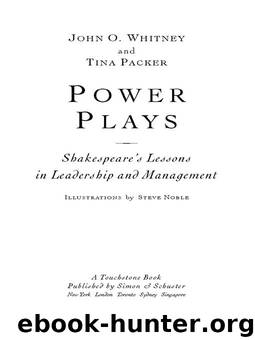Power Plays: Shakespeare's Lessons in Leadership and Management by John O. Whitney & Tina Packer

Author:John O. Whitney & Tina Packer [Whitney, John O.]
Language: eng
Format: mobi
Publisher: Simon & Schuster
Published: 2002-05-29T14:00:00+00:00
KING RICHARD III (3.7, 95–98)
Buckingham and Richard have set a perfect stage for the appearance of a devout, modest prince. Richard, of course, is a faithless, arrogant monster. But his performance wins over the mayor and the people.
——
THE BEST USES OF CEREMONY
As a professional actor and director, Tina Packer has thought a lot about how cultures and other smaller groups use ceremony to their advantage. Ceremony, she points out, is the rites and rituals that allow us to belong to a group. In order to have harmony, in order to empathize with one another, in order to feel camaraderie, we need to believe that there is a collective good as well as an individual good. In order to say, “This is important,” we create ceremonies.
To celebrate success, we create ceremonies. Sports teams and Japanese corporations have long recognized the benefits of ceremony. The dancing girls, the mascots, the chants—even the hot dogs and beer—are part of the ceremony in sporting events. New Zealand’s All Blacks rugby team has a special ritual, a kind of Maori war dance, that they perform on the field, complete with grunts and growls, to put awe and fear into their opponents even before the match begins (and most of the time, it succeeds). Scottish fighting forces used to go into battle accompanied by the sound of special bagpipe cries, also designed to terrorize the enemy before the fight began. Japanese firms have “welcome to the workforce” ceremonies that help newcomers bond to a company that wants them to be employees for life. The Japanese also celebrate various rites and rituals and sing the corporate anthem when employees get promoted or finally retire.
At U.S. companies we might have a party for new retirees, present them with a gold watch for their good work and loyalty, but we are not very good at collective ceremonies. Perhaps it’s because our Puritan ancestors frowned on parties and the ceremonies of the Roman church. However, any new king or queen knew it was best to get crowned as soon as possible. Coronations required every follower to swear allegiance to the crown, and the more elaborate the public ritual, the more difficult it would be for any subject later to break an oath made in the presence of so many people. In King Richard II, moments after Richard has agreed to abdicate, Bolingbroke’s first words are “On Wednesday next we solemnly set down / Our coronation.” As soon as Richard III accepts the lord mayor’s offer of kingship, discussions begin about when to schedule his coronation. Even today, coronations and other royal ceremonies are done with as much pomp and circumstance as possible to create a reality that transcends the everyday and thus make it more significant and memorable. (Remember Charles and Diana’s wedding? Diana’s funeral?)
So why not invent a few rituals for your company appropriate to your team and the job they’re doing? They need not be centered around rewarding the person who has made the most sales. Wednesday could
Download
This site does not store any files on its server. We only index and link to content provided by other sites. Please contact the content providers to delete copyright contents if any and email us, we'll remove relevant links or contents immediately.
Pioneering Portfolio Management by David F. Swensen(6288)
Man-made Catastrophes and Risk Information Concealment by Dmitry Chernov & Didier Sornette(6005)
Zero to One by Peter Thiel(5786)
The Motivation Myth by Jeff Haden(5204)
The Miracle Morning by Hal Elrod(4712)
Elon Musk by Ashlee Vance(4121)
Unlabel: Selling You Without Selling Out by Marc Ecko(3658)
The Art of Persistence: Stop Quitting, Ignore Shiny Objects and Climb Your Way to Success by Michal Stawicki(3646)
Delivering Happiness by Tony Hsieh(3418)
Urban Outlaw by Magnus Walker(3392)
Purple Cow by Seth Godin(3197)
The Marketing Plan Handbook: Develop Big-Picture Marketing Plans for Pennies on the Dollar by Robert W. Bly(3047)
Mastering Bitcoin: Programming the Open Blockchain by Andreas M. Antonopoulos(3035)
The Power of Broke by Daymond John(2975)
The Content Trap by Bharat Anand(2917)
Applied Empathy by Michael Ventura(2892)
The Airbnb Story by Leigh Gallagher(2851)
Keep Going by Austin Kleon(2755)
Radical Candor by Kim Scott(2715)
